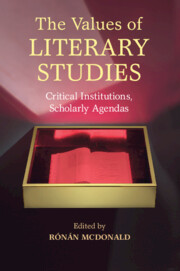Book contents
- Frontmatter
- Contents
- Notes on Contributors
- Acknowledgments
- Introduction
- 1 The Value of Criticism and the Project of Modernism
- 2 Caprice: Individual Subjectivity in Literary Criticism
- 3 The Phenomenology of Literary Valuation
- 4 Literature Is History: Aesthetic Time and the Ethics of Literary Will
- 5 Dead on Arrival: Time and the Value of Old Books
- 6 The Price of Value
- 7 To Shelter the Nothing That Happens
- 8 When Literary Criticism Mattered
- 9 Literature among the Objects of Modernist Criticism: Value, Medium, Genre
- 10 “Vale!” : Psychoanalysis, Value, and Literature
- 11 Afterlives of Comparison: Literature, Equivalence, Value
- 12 Feminism, Gender, and the Literary Commons
- 13 The Value of World Making in Global Literary Studies
- 14 Multiple Versions and Fictional Minds: Manuscript Research, Digital Editing, and Enactive Cognition in Literary Studies
- 15 After Suspicion: Surface, Method, Value
- 16 Literary Experience and the Value of Criticism
- Index
6 - The Price of Value
Published online by Cambridge University Press: 05 November 2015
- Frontmatter
- Contents
- Notes on Contributors
- Acknowledgments
- Introduction
- 1 The Value of Criticism and the Project of Modernism
- 2 Caprice: Individual Subjectivity in Literary Criticism
- 3 The Phenomenology of Literary Valuation
- 4 Literature Is History: Aesthetic Time and the Ethics of Literary Will
- 5 Dead on Arrival: Time and the Value of Old Books
- 6 The Price of Value
- 7 To Shelter the Nothing That Happens
- 8 When Literary Criticism Mattered
- 9 Literature among the Objects of Modernist Criticism: Value, Medium, Genre
- 10 “Vale!” : Psychoanalysis, Value, and Literature
- 11 Afterlives of Comparison: Literature, Equivalence, Value
- 12 Feminism, Gender, and the Literary Commons
- 13 The Value of World Making in Global Literary Studies
- 14 Multiple Versions and Fictional Minds: Manuscript Research, Digital Editing, and Enactive Cognition in Literary Studies
- 15 After Suspicion: Surface, Method, Value
- 16 Literary Experience and the Value of Criticism
- Index
Summary
My essay, though it is meant to address the “economic” dimension of value in this collection, approaches the topic at a rather steep rake. This is partly because the full-frontal approach, so to speak, has already been developed: there is a sturdy tradition of work that compares literary texts and economic ideas in analogical and homological terms, for instance – not least work in the vein of Jean-Joseph Goux and Marc Shell. In this work it becomes possible to see long histories of overlap between how we have historically conceptualized words and coins, say, or householding and rhetorical economy. For a student of twentieth-century poetry like myself, such work provides an important back-history to the work of a poet like Ezra Pound, for whom matters of economics, rhetoric, pedagogy, and poetry all twined together in ways that continue to influence poets to this day.
More recent work has explored the intimate relationship between key elements of modern literary and economic theories. Tim Kreiner, for instance, has traced not only the similarities between Saussurean linguistics and marginalist economics, but also their historical coemergence. Kreiner's work not only outlines the way Saussurean linguistics, which is built around the idea that the specificity and value of any given word is built out of a differential relation between that word and the words around it, but also mimics marginalist economics, which imagines economic value to be produced in the price differences among commodities. He also situates Saussure's project, worked out beginning in 1907 at the University of Geneva, in the long shadow of Swiss marginalism, whose intellectual prestige ran high, through the renowned work first of Leon Walras, and later Wilfredo Pareto, both of whom were chair of political economy at the University of Lausanne from the late nineteenth to the early twentieth century. There is certainly still a story to be told about how the literary theories built up around a Saussurean model of potential difference carry with it liberal-reformist politics of marginalism, whose focus on the way marginal-use values could afford the modern world a potential infinity of value was meant quite explicitly as a riposte to insurgent socialist theories of the economy that imagined a zero-sum game between capitalists and workers.
- Type
- Chapter
- Information
- The Values of Literary StudiesCritical Institutions, Scholarly Agendas, pp. 91 - 104Publisher: Cambridge University PressPrint publication year: 2015
- 10
- Cited by

